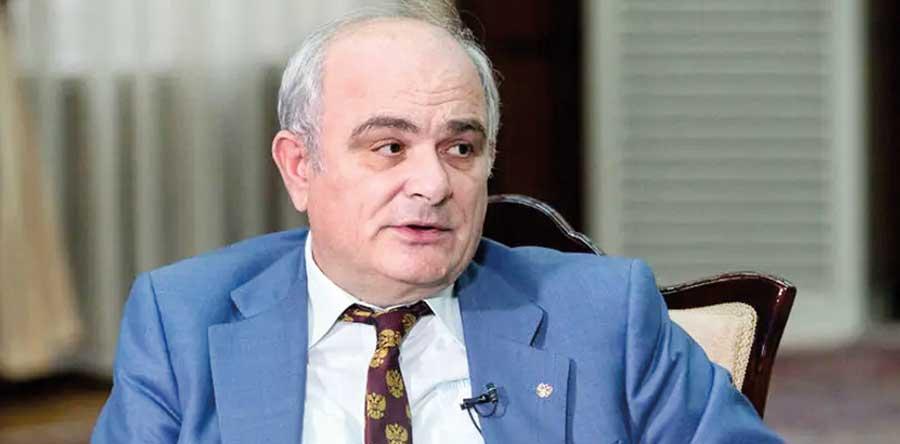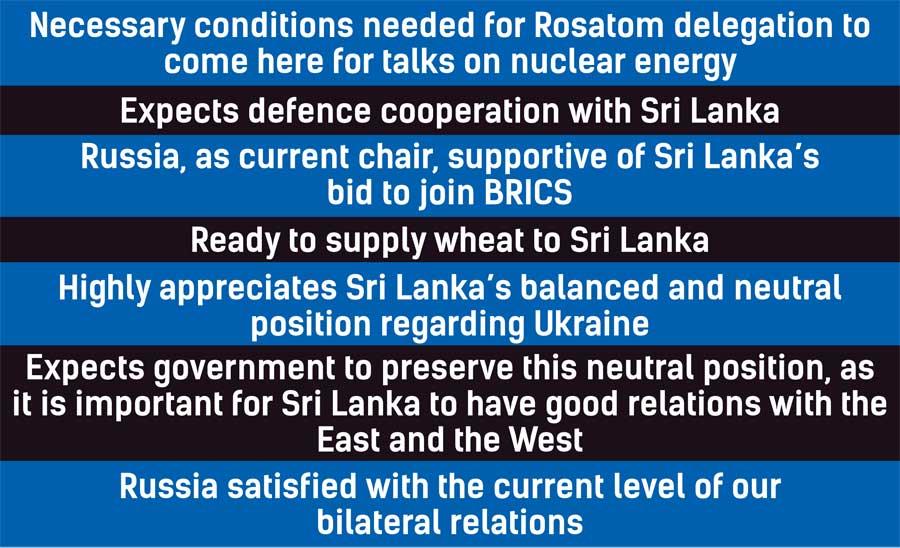Reply To:
Name - Reply Comment


Russian Ambassador Levan Dzhagaryan, in an interview with Daily Mirror, discusses the current status of bilateral ties, and what is being planned for the future. 
Excerpts:
 Q How did the recent visit of a top level Russian delegation help elevate bilateral ties?
Q How did the recent visit of a top level Russian delegation help elevate bilateral ties?
We are satisfied with the current level of our bilateral relations. Another indication of it was the visit of a high-ranking Russian delegation.
It was a rather big delegation of more than 40 people, headed by Nikolai Patrushev, the Secretary of the Security Council of the Russian Federation. He had a very important meeting with President Ranil Wickremesinghe on December 6, 2023. He had a meeting with Defence Secretary, Major General (Rtd) Kamal Gunaratne. The latter was in Moscow in May, last year. So it’s a continuation of bilateral dialogue. Also, Mr. Patrushev, when he was in Colombo last December, extended his invitation to Mr. Gunaratne to visit Russia in the coming year.
There were meetings with the representatives of our Ministries - the Minister of the Interior, the Minister of Security Affairs and some other bodies.
A separate meeting was held between the representatives of the Russian Ministries of Agriculture, Transportation, Industry, Central Bank and their counterparts under the auspices of the Russia-Sri Lanka Business Council. We are satisfied. We have discussed some issues and made some proposals from both sides. The continuation of this dialogue will take place in April.
Q The defence cooperation is sought in a special context when the Russia-Ukraine war is going on, and a crisis situation is seen in the West Asian region. So what kind of defence cooperation does Russia expect to maintain with Sri Lanka in that context?
First of all, I would like to say it’s not Russia-Ukraine war in our understanding. It’s a special military operation, which Russia started. It’s war between Russia and the collective West in the Ukrainian territory. The western countries would like to inflict a defeat to Russia, a strategic defeat. But we will defeat the puppet regime in Ukraine and their foreign sponsors. Regarding defence cooperation, mainly we are talking about education for Sri Lankans
Q Education means?
Yes, let’s say, for military. We are discussing education for students - not only civilians, but for military too.
We have already declared our readiness to set up a small nuclear power station – either offshore or onshore; it maybe 110 megawatts or more (the technical aspects will be decided by the specialists). However, it is Sri Lanka’s sovereign decision, as only the Sri Lankan government can decide whether they want to cooperate with Russia or with other countries. We don’t exert any pressure. We only try to convince. We have very good cooperation with your neighbours – first of all with India and Bangladesh
Q Actually from a defence perspective, how do you view Sri Lanka’s strategic positioning?
Of course, the strategic positioning of Sri Lanka is very important. And we highly appreciate your balanced and neutral position, also regarding Ukraine.
Despite pressure which is exerted on you from the West, we expect your government to preserve this neutral position. It is very important for Sri Lanka to have good relations with both the West and the East.
Q During the war, we used to purchase a lot of military equipment from Russia. What about the situation now?
It was from Russia and also from the former Soviet Union. We are open to discuss everything. You have military cooperation with Western countries, India and China. So, why not with Russia?
Q What are the follow-up actions taken after that high-level visit?
We expect some other visits. We are now working on the prospects of political consultations at different levels. Maybe some delegations will come. For example, the Minister of Agriculture got an invitation to come here in February.
So, Sri Lanka’s Minister of Agriculture, Mahinda Amaraweera sent his Russian counterpart, Mr. Dmitry Patrushev the invitation to participate in the international conference held under UN auspices.
In the agriculture sector, the potential areas for cooperation are primarily fertilizers and the supply of food. We are ready to supply wheat to Sri Lanka, and some other items. By the way, two of our ships carrying vegetable oil have already arrived at the Port of Colombo. That is a humanitarian aid to the friendly people of Sri Lanka. It is part of the Russian contribution to the World Food Programme to provide Sri Lanka and other countries with food.”
Q In the agriculture sector, what are the potential areas for cooperation?
First of all fertilizers. Also the supply of food. We are ready to supply wheat to Sri Lanka and some other items. By the way, two of our ships carrying vegetable oil have already arrived at the Port of Colombo. That is a humanitarian aid to the friendly people of Sri Lanka. I participated in the ceremony of handing over similar humanitarian aid to Sri Lanka in September last year.
It is part of the Russian contribution to the World Food Programme to provide Sri Lanka and other countries with food.
Q Russia-Sri Lanka cooperation is going on well as far as tourism is concerned. These days Sri Lanka receives a lot of tourists from Russia. Actually, in what ways can Russia help increase the number?
There is no need for special propaganda because Sri Lanka is a well-known destination for Russians. They are very happy when they come here. We expect to mark in February, 200,000 arrivals by direct flights from Russia since they were resumed. We have many direct flights per week from Moscow and from other Russian cities, both to Colombo and Mattala.
A lot of Russians are coming via Arab or Gulf countries too. It is a big contribution to your economy. They spend money here. It is also very important for your budget and for the employment of people engaged in tourism.
Q During the top-level meeting, Chairman of Sri Lanka Atomic Energy Authority, Prof. S.R.D. Rosa made a briefing on Sri Lanka’s position regarding nuclear energy. How far have you progressed in this regard?
First of all, I would like to use this opportunity to express once again my personal respect to Prof. Rosa and his staff members for their collaboration, and their readiness to cooperate with Russia. There are some issues to be settled in Sri Lanka. I mean legislation that is to be settled. We are trying together to pave the way for a continuation of negotiations as we are aware that Sri Lanka has got some proposals from other countries.
We are ready to offer something. It is important to create necessary conditions for the Russian delegation from the Rosatom State Atomic Energy Corporation to come here.
They can discuss the issues of mutual interest. I’m not authorized to discuss the details. We have already declared our readiness to set up a small nuclear power station – either offshore or onshore. It maybe 110 megawatts or more. I don’t know technically. It’s up to the specialists.
It is your sovereign decision. Only the Sri Lankan government can decide whether they want to cooperate with Russia or with other countries. We don’t exert any pressure.
We only try to convince. Rosatom is a world leader in terms of the construction of nuclear power plants. We have very good cooperation with your neighbours – first of all with India and Bangladesh. We started our cooperation very practically. With Myanmar, we have very good cooperation. We have cooperation with Belarus, Hungary, Egypt, Turkey and Iran. So we are the leaders.
Q What kind of cooperation do you expect? Is it a kind of a model similar to what you do in Bangladesh and India?
It’s up to the negotiations among the specialists. First of all, we must create the necessary atmosphere and the necessary conditions. We expect you to extend the invitation to our Russian delegation to come. We are ready for negotiations.
When it comes to Tourism, there is no need for special propaganda because Sri Lanka is a well-known destination for Russians. They are very happy when they come here. We expect to mark in February, 200,000 arrivals by direct flights from Russia since they were resumed. A lot of Russians are coming via Arab or Gulf countries too. It is a big contribution to the Sri Lankan economy
Q Is that one of the key elements or features of bilateral discussions at the moment?
Yes. I just said in one of my press conferences that the ball is in your court because you have to sign respective agreements to join international treaties. That is about physical security and some others. Our colleagues in this organization and the foreign ministers know it.
It’s very important that your country continues very useful cooperation with the IAEA (International Atomic Energy Agency) in Vienna.
Q Sri Lanka is trying to play a kind of an active role in the Global South. The President says the foreign policy is clearly Asia-centric. So, how does Russia view it actually?
It is very positive because Sri Lanka is one of our friendly countries historically. We have never had any problems with Sri Lanka. A lot of Sri Lankans have graduated from Russian and former Soviet universities. We are very proud of that. They have now occupied very important positions - some in state bodies, and others in private business. They are very helpful in terms of furthering the development of bilateral relations between Russia and Sri Lanka.
We highly appreciate that once again in terms of Ukraine, Sri Lanka as well as a major part of the Global South have adopted a neutral and balanced position. Colombo didn’t join sanctions against Russia because sanctions are counterproductive. Okay. Some countries that adopt neutral, balanced positions don’t join sanctions against Russia.
Q Is there any possibility for the Presidents of the two countries to meet, actually?
There was a good opportunity in China recently during the Belt and Road (BRI) summit. They only shook hands, as far as I know. I think it’s because of the fact that both the Presidents were occupied, and their programmes were just agreed before.
Hopefully, next time. Maybe there will be some international meeting. You know Russia has become the current President of BRICS.
BRICS has become larger. Many countries have joined BRICS - Saudi Arabia, UAE, Ethiopia, and Egypt.
We highly appreciate Sri Lanka’s balanced and neutral position regarding Ukraine. We expect the Sri Lankan government to preserve this neutral position, as it is important to have good relations with the East and the West. The West is now preoccupied with other issues – such as the Middle-East crisis. Yes, it is a crisis. The main issue is that Palestinians were deprived of the possibility to have their own country for many decades. They must have their own country within the borders of 1967 with the capital of Eastern Jerusalem. They were deprived of it. That’s where the roots of the conflict are
Q Sri Lanka has also announced that it is willing to join BRICS. What is your view?
I don’t see any problem. You have to meet some criteria. For Sri Lanka, I think, it’s not a problem. Sri Lanka has friendly relations with all the member countries.
BRICS has become a very popular international organization. We will continue the integration of our economies and our cooperation in many fields. It consists of many powerful countries like China, India, and South Africa.
Q Will Russia be cooperative with Sri Lanka?
Of course. We expect a more active role of Sri Lanka in the Shanghai Cooperation Organization. Sri Lanka is currently the President of the IORA (Indian Ocean Rim Association). We are also a dialogue partner country. There will be some meetings and some sessions.
Our delegations from Russia are ready to participate. There was a Ministerial meeting last October.
Q In your view, how long will the Russia-Ukraine war drag on?
You know it’s difficult to say because you cannot compare the capability of Russia to Ukraine. They’re still resisting thanks to the help of Western countries.
But their, let’s say, capability is being exhausted. Americans have elections. Europeans have huge economic problems. Look what’s going on in Germany! Strikes by farmers, by railway workers .They’re fed up with it. They spend a lot of money for the puppet regime in Ukraine - bankrupt and corrupt regime.
The West is now preoccupied with other issues – such as the Middle-East crisis. Yes, it is a crisis. The main issue is that Palestinians were deprived of the possibility to have their own country for many decades.
They must have their own country within the borders of 1967 with the capital of Eastern Jerusalem. They were deprived of it. That’s where the roots of the conflict are.